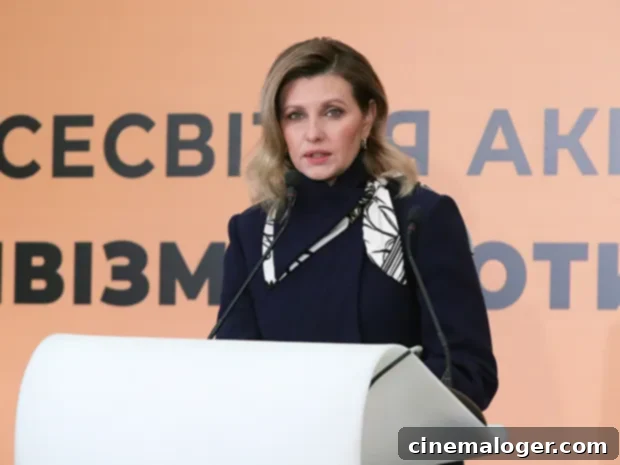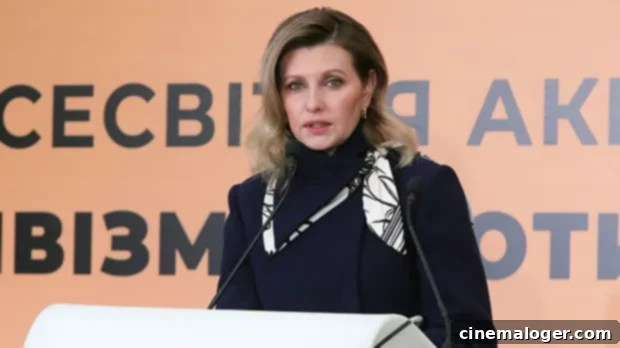Ukrainian First Lady Olena Zelenska Reveals Horrific Russian Hospital Attack, Urges Urgent International Action and No-Fly Zone
In a powerful and deeply moving display of the brutal reality facing Ukraine, First Lady Olena Zelenska has once again leveraged her platform to shed light on the devastating consequences of Russia’s ongoing aggression. Through a series of harrowing videos posted on her official Instagram account, Zelenska brought global attention to the deliberate destruction inflicted upon a Ukrainian hospital, an act that underscores the indiscriminate nature of the conflict and the severe humanitarian crisis unfolding. These heart-wrenching visuals serve as an undeniable testament to the atrocities committed against civilian infrastructure, particularly targeting places of healing and hope.
Ukrainian First Lady Olena Zelenska courageously utilized her Instagram presence to expose the horrific attacks perpetrated by Russian forces against her nation. Among the most egregious incidents highlighted was the complete devastation of a maternity hospital and medical center, obliterated by an airstrike on Wednesday, March 9. The videos she shared painted a grim picture: scenes of overwhelming debris, the chaotic aftermath of destruction, and glimpses of courageous individuals attempting to provide aid amidst the rubble. A few distressed people could be seen fleeing the scene, their faces etched with shock and fear. In the background, the anguished cries and urgent shouts of men and women speaking Ukrainian served as a haunting soundtrack to the unfolding tragedy, amplifying the raw emotion and despair permeating the air. This targeted attack on a medical facility, a protected site under international humanitarian law, signifies a profound disregard for human life and the established rules of war.
View this post on InstagramA post shared by Olena Zelenska (@olenazelenska_official)
In her poignant message accompanying the horrific footage, the wife of President Volodymyr Zelenskyy conveyed the immediate and dire lack of information regarding the casualties from the devastating attack. The true human cost remained uncertain, yet her plea was clear and urgent: she implored international forces, particularly NATO, to take decisive action to prevent any further escalation of Russian aggression and protect innocent lives. “That’s a terrifying video, but we can’t see the worst yet. We do not know how many mothers and children were killed and injured,” she wrote, highlighting the profound despair and uncertainty. Her call for a no-fly zone over Ukraine was unequivocal: “We ask NATO to close our sky on behalf of entire Ukraine. We ask for anything like this to never happen again, but we are not being heard. In the meantime, the enemy planes are blatantly murdering civilians.” This impassioned appeal underscores the critical need for robust international intervention to safeguard civilian populations from aerial assaults, a measure that Ukrainian leadership has consistently championed as essential to stemming the tide of destruction.
The plea for a no-fly zone, while understandable from a nation under siege, has sparked intense debate among NATO members and international policy experts. Implementing such a zone would entail NATO aircraft enforcing it, potentially leading to direct military engagement with Russian forces and a significant escalation of the conflict, which Western leaders are keen to avoid. However, for a country enduring relentless bombardment, the concept of a protected airspace represents the most immediate hope for preventing further civilian casualties and preserving critical infrastructure. The images shared by the First Lady vividly demonstrate the profound human suffering that drives this desperate request, reminding the world of the daily terror faced by ordinary Ukrainians.
This devastating incident is far from an isolated occurrence. The First Lady has consistently utilized her platform to highlight the tragic realities faced by countless women and children in Ukraine since Russia’s full-scale invasion commenced. Zelenska has meticulously detailed the extraordinary measures schools and hospitals have been forced to adopt simply to function amidst the relentless attacks. “Ukrainian children have to live and study in bomb shelters, and hospitals have to treat their patients in basements,” she wrote in a powerful Instagram post on March 2. This grim adaptation to war-torn conditions speaks volumes about the resilience of the Ukrainian people, but also about the immense psychological and physical toll exacted by the conflict. The displacement of millions, the disruption of education, and the severe strain on healthcare systems constitute a humanitarian catastrophe of staggering proportions. The First Lady’s efforts ensure that these daily struggles do not go unnoticed by the international community, serving as a powerful advocate for those most vulnerable.
Attacks on hospitals and medical personnel are a grave violation of international humanitarian law, specifically the Geneva Conventions, which stipulate the protection of civilian infrastructure and non-combatants during armed conflict. The destruction of a maternity hospital is particularly heinous, representing an attack on the very essence of life and future generations. Such acts are widely condemned as potential war crimes, prompting calls for investigations by international bodies like the International Criminal Court. Olena Zelenska’s visual evidence contributes directly to the documentation of these potential crimes, providing crucial testimony for future accountability efforts.

Beyond detailing the arduous conditions under which Ukrainian schools and hospitals operate, Zelenska has actively sought to galvanize broader international support. She posted videos showcasing the solidarity expressed by two other European First Ladies, urging her global audience and other influential figures to vocally condemn Russia’s actions and specifically call out Russian President Vladimir Putin. Her message was stark and uncompromising: “Don’t be quiet! Tell them that Putin is threatening to start a nuclear war, and if he does, there will be no safe place in the world anymore,” she wrote in a powerful caption accompanying the videos. This direct appeal reflects the profound anxiety within Ukraine regarding Russia’s aggressive rhetoric and the potential for a catastrophic escalation. Her persistent advocacy highlights the critical role of public diplomacy and moral pressure in shaping international opinion and policy during times of crisis. By amplifying these voices and framing the conflict in stark, human terms, Zelenska aims to maintain global focus on Ukraine’s plight and underscore the universal threat posed by unprovoked aggression.
The First Lady’s active role is a significant departure from traditional diplomatic norms, transforming her into a frontline advocate for her nation. Her direct appeals on social media platforms bypass traditional media filters, allowing her to reach a vast international audience instantaneously. This strategic communication approach has been instrumental in countering Russian disinformation and ensuring that the human cost of the invasion remains at the forefront of global consciousness. Her ability to connect with people on an emotional level makes her an incredibly effective voice for Ukraine, rallying support and sympathy from individuals and governments worldwide.
In response to Russia’s initial, unprovoked attack on February 25, President Joe Biden of the United States swiftly announced new, stringent sanctions designed to inflict significant damage on the Russian economy. These measures were part of a coordinated international effort to impose severe costs on Moscow for its aggression. Further demonstrating robust solidarity with Ukraine, President Biden extended a special invitation to Ukrainian Ambassador Oksana Markarova to attend his State Of The Union address as a distinguished guest. This gesture served as a powerful symbol of unwavering American support for Ukraine’s sovereignty and territorial integrity. As part of the ongoing, multifaceted effort to combat Russia’s sustained attacks and cripple its war machine, the President announced a landmark ban on Russian oil imports on Tuesday, March 8, a move widely reported by CNN. This particular sanction, though potentially impacting global energy markets, was deemed essential to cut off a major source of funding for the Russian military, further increasing economic pressure on the Kremlin to halt its invasion.
The coordinated global response, including financial sanctions, military aid, and humanitarian assistance, reflects a broad international consensus condemning Russia’s actions. Beyond the US, the European Union, the United Kingdom, Canada, and numerous other nations have imposed their own sets of sanctions, targeting Russian banks, oligarchs, and key industries. These collective efforts aim to isolate Russia economically and politically, forcing it to reassess its aggressive posture. However, as Olena Zelenska’s continuous appeals demonstrate, the need for more direct protective measures for Ukrainian civilians remains a pressing concern, urging leaders to consider all possible avenues to end the violence and prevent further humanitarian disasters.
The courage shown by Olena Zelenska and the entire Ukrainian leadership during this period of unprecedented crisis has resonated worldwide. Their steadfast resolve to defend their nation and its people, even in the face of overwhelming odds, has inspired global admiration and solidarity. As the conflict continues, the importance of maintaining international awareness and support, as championed by the First Lady, cannot be overstated. The stories of destruction and resilience emanating from Ukraine serve as a stark reminder of the fragile nature of peace and the imperative for collective action against aggression.
